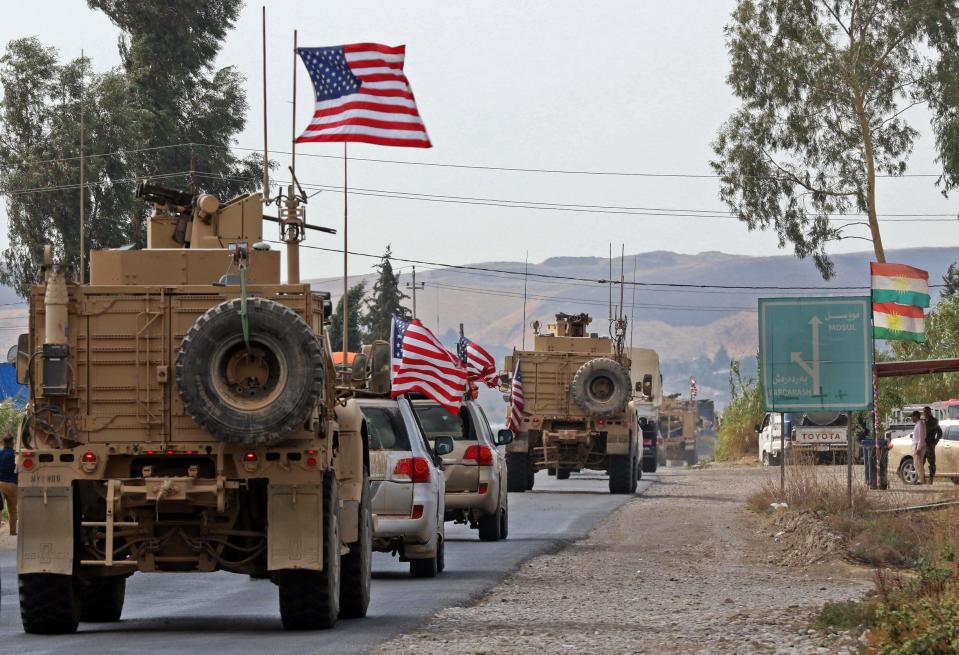Amid confusion and criticism, Trump says 'small' contingent of US troops will stay in Syria
WASHINGTON – President Donald Trump said Monday that a "small" number of U.S. troops will remain in Syria amid blistering criticism from lawmakers in both parties who have denounced his previous decision to withdraw American forces.
“I’m trying to get out of wars. We may have to get in wars, too,” Trump said during in a rambling, 70-minute Cabinet meeting on Monday.
Trump's remarks came after residents of a Kurdish city in Syria hurled potatoes and insults at departing U.S. troops on Monday, the latest sign of the Kurds' bitter sense of betrayal after Trump seemed to pave the way for a deadly Turkish assault that began nearly two weeks ago.
The scene was captured in a video posted by a Kurdish news agency and showed a convoy of American armored vehicles driving through the northeastern city of Qamishli.
“Like rats, America is running away,” one man shouted in Arabic, according to the Associated Press. Another shouted obscenities and said babies in Kurdish-held areas had died in the Turkish offensive.
Monday's incident occurred just days after the U.S. brokered a temporary cease-fire between the Turkish forces and the Kurdish fighters, who were America's chief ally in the fight against the Islamic State. Under that deal, the Kurds are supposed to withdraw from a "safe zone" on the Syrian side of the Turkey-Syria border, ceding territory they had gained during the battle against ISIS.

The Associated Press reported that Kurdish forces pulled back from the border town of Ras al-Ayn on Sunday, paving the way for Turkish troops deployment in the area. But the cease-fire is set to expire on Tuesday, and Kurdish civilians remain fearful that Turkish forces will resume their attacks.
A senior Kurdish official, Redur Khalil, said Monday his forces are preparing to complete the withdrawal. But he called for an international mechanism to protect Kurdish civilians who want to stay in their towns after the Kurdish fighters leave.
Trump has sent conflicting signals on Syria for months, and Monday was no exception. In December 2018, he ordered a full withdrawal of the more than 2,000 troops based in the war-torn country, declaring that ISIS had been defeated. The president then backed down after a fierce backlash from within his own party.
With GOP lawmakers warning that ISIS would make a comeback if the U.S. left, he agreed to leave a residual force in Syria.
But earlier this month, Trump seemed to reverse course again. He first ordered an estimated 50 U.S. troops to pull back from two outposts on the Turkey-Syria border, paving the way for Turkey to attack the Kurds in that region.
A day later, he suggested the U.S. would make a complete withdrawal, tweeting on Oct 7: "I held off this fight for almost 3 years but it is time for us to get out of these ridiculous Endless Wars ... and bring our soldiers home."
"... Turkey, Europe, Syria, Iran, Iraq, Russia and the Kurds will now have to figure the situation out," he wrote.
That move has once again sparked outrage in Congress, with lawmakers calling it a betrayal of the Kurds that risked unleashing chaos in the region, to the benefit of Russia and Iran.
On Monday, Trump initially said he didn't want to leave any troops in Syria, only to concede seconds later that he would be doing so – if only to secure the country's oil fields.
"We've been asked by Israel and Jordan to leave a small number of troops in a totally different section of Syria," he said. "So we have a small group there, and we secured the oil. Other than that, there's no reason for it."
Trump seemed to be confirming a statement from Defense Secretary Mark Esper, who said on Sunday the administration was considering leaving troops behind to secure the oil fields in the region, amid fears that valuable territory could fall into the hands of ISIS.
Esper also said that the rest of American troops leaving Syria will not return to the U.S. Instead, he said they will go to Iraq, where they will be positioned to conduct possible operations against the Islamic State.
The Turkish invasion has created chaos in the region, with Iran, Russia and Syria's brutal dictator, Bashar al-Assad, vying for influence in the vacuum left by the U.S. withdrawal.
Senate Majority Leader Mitch McConnell, R-Ky., said Trump's decision to withdraw U.S. troops from Syria has created "a strategic nightmare for our country."
In an op-ed for the Washington Post, McConnell wrote that it has jeopardized the U.S. campaign against the Islamic State, handed a win to the Assad regime and its Iranian backers, and allowed Russia to gain a new foothold in the Middle East.
"It will leave the American people and homeland less safe, embolden our enemies, and weaken important alliances," McConnell wrote.
Trump on Monday said the cease-fire is holding and blasted his critics as "fake pundits."
“We’re having very good news coming out," Trump said. "The ceasefire’s holding.”
He also took credit for defeating ISIS.
“I’m the one who did the capturing," Trump said. "I’m the one who knows more about it than you people or the fake pundits.”
Contributing: Associated Press
This article originally appeared on USA TODAY: Syria: In shift, Trump says 'small' number of US troops to stay

